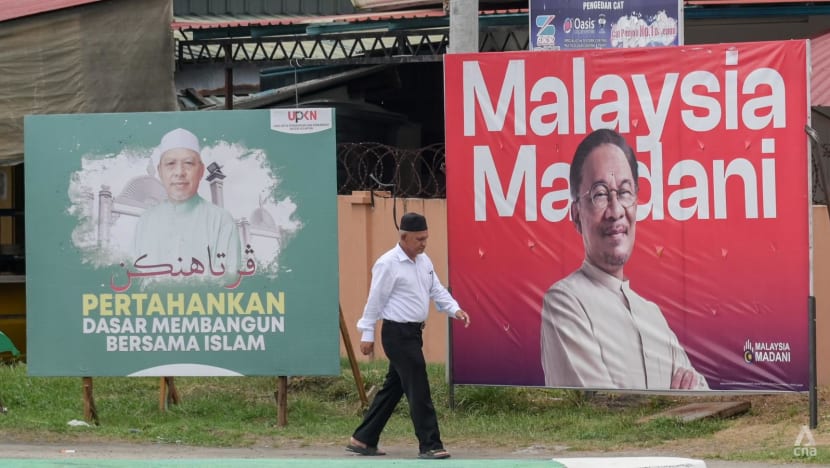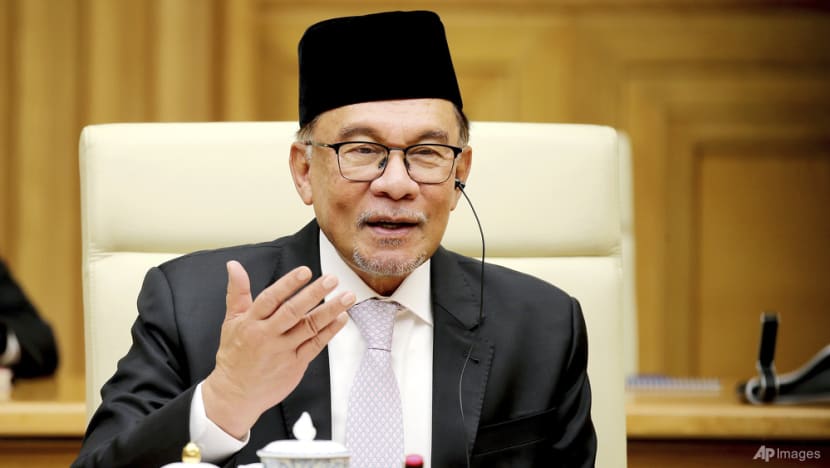Commentary: What impact do state elections have on Malaysians anyway?
Status quo at the Aug 12 state elections poses no danger to Malaysian Prime Minister Anwar Ibrahim at the parliamentary level, but it will feed tensions in the federal-state relationship, says CNA’s Leslie Lopez.

KUALA LUMPUR: About 9.7 million Malaysians will head to the ballot box on Aug 12 to elect 245 assembly members in six states. How they may vote is still hard to gauge but the general consensus is that the status quo will hold.
Prime Minister Anwar Ibrahim’s Pakatan Harapan-led coalition will likely hold on to Selangor, Negeri Sembilan and Penang. The state assemblies of Kedah, Kelantan and Terengganu will likely remain under the opposition, or more specifically, the right-wing Parti Islam Se-Malaysia (PAS).
Much of the attention on the upcoming state elections has been about their impact on Mr Anwar’s mandate. But the status quo at the state level poses no danger to Mr Anwar at the federal level, with his unity government enjoying a two-thirds majority in parliament.
It would however indicate federal-state ties are likely to stay prickly.
Over the last eight months since Mr Anwar came to power, ties between his unity government and the opposition-led states have been hostile, with PAS accusing Putrajaya of holding back on federal funding for economic development. Few analysts, if any, expect the situation to change.

CENTRALISED POLITICAL POWER
For a long time, political power in Malaysia has been largely centralised at the federal level. The few states governed by the opposition were regularly denied resources, both financial and central support for their economic programmes.
During Dr Mahathir Mohamad’s first stint as prime minister heading the Barisan Nasional (BN) government, for 22 years beginning in 1981, the states of Kelantan and Terengganu were denied royalty payment from oil and gas extracted from the states by national oil corporation Petronas.
Kelantan fell to the opposition in 1990, becoming a PAS stronghold since. PAS wrested control of Terengganu in 1999 and suffered a similar fate from the Mahathir government at the time.
But things were shaken up after the 2018 general election when BN was ousted from power after ruling for six decades, starting a chain of events that pushed Malaysia into a prolonged period of political uncertainty. Power changed hands three times before the 2022 general election.
It also led to a shakeup in how elections were carried out. All states, except Sabah and Sarawak, traditionally synchronised their state assembly elections together with the national polls, but only three states did so in November 2022.
WHAT IMPACT DO STATE ELECTIONS HAVE ANYWAY?
The uncoupling of state and national polls has stirred a separate debate. While opposition politicians argue that the ability to dictate the timing for the state polls grants them greater autonomy, in reality it allows the federal government with all the resources at its disposal to overwhelm regional political entities.
Regardless, issues over political stability continue to plague Malaysia’s economic outlook. Economic tensions are also more keenly felt as the opposition-held states lag economically. In 2022, the gross domestic product per capita in Kedah, Kelantan and Terengganu were markedly lower than that in Negeri Sembilan, Selangor and Penang.
With the economy and costs of living issues top of mind ahead of the polls, what are the roles of the federal and state governments in tackling them?
The opposition led by PAS has attacked the current government for failing to address cost of living issues faced by ordinary Malaysians. Mr Anwar has been responding aggressively in the run-up to the August state polls.
His PH-led government has been announcing pledges to improve the flagging economies of the PAS-controlled states, arguing the party has failed to meld strong economic management with its lofty religious agenda. On Thursday (Jul 27), Mr Anwar announced huge federal financial allocations for Kelantan for flood mitigation projects and RM100 (US$22) cash handouts for low and middle-income Malaysians.
IT INVARIABLY GOES BACK TO IDENTITY
How else do state elections impact Malaysians? It invariably goes back to identity.
It is in the PAS-controlled states where the rhetoric over race and religion rings loud. Claims that Mr Anwar’s multi-racial coalition government pose a direct threat to the position of Malays and Islam in the country flood the social media as campaigning picks up steam.
PAS has toned down its aims to create a theocratic state but still seeks to expand its influence. Its brand of religious politics has clearly found some support outside the rural areas it was typically confined to: PAS won 49 seats in the 2022 general election making it the largest party in parliament.
PAS and Parti Pribumi Bersatu Malaysia (Bersatu), the other purely Malay opposition party that together make up the Perikatan Nasional (PN) coalition, are determined to show that their strong showing last year was no fluke. Mr Anwar’s PH coalition failed to win any parliamentary seats in Kelantan and Terengganu and only captured one seat in Kedah.
On his part, Mr Anwar has put up a confident front on the state election campaign trail about the opposition falling to PH in Terengganu and Kedah, saying that the Malay-majority voters will vote in favour of development promised with his economic reform agenda.
Even if his government’s parliamentary seats are not in play in the coming weeks, the state elections will be crucial for Mr Anwar to cut through the political din and gauge public opinion and appetite for his reforms.
Leslie Lopez is a senior correspondent at CNA Digital who reports on political and economic affairs in the region.













.png?itok=RyE01mAX)





